- Home
- Alan Scholefield
Venom
Venom Read online
Alan Scholefield
For Ronald Harwood
Part I
Friday, 2.10 p.m. - 6.12 p.m.
Philip was so close to the animal that all he could see was its teeth. Only inches from the wire they appeared huge: they curved down to a serrated edge, flanked by two sharp incisors that looked as though they could pierce case-hardened steel. They were yellowish with dark brown stains at the roots and shone with a film of saliva. He was so close that his depth of focus was isolating them and turning lips and hair into an amorphous grey blur. They were rending teeth, tearing teeth, teeth that could chop and cut, rip and worry. Philip saw himself in a sudden waking dream on his back under a . . . under an acacia tree. Yes, that was it, an acacia tree. The lion had its paws on his chest and he was looking up into those same yellow teeth. In a second the jaws would close on his face, tearing away his nose and eyebrows, removing the front of his face as though it were a rubber mask, leaving only red meat and livid white bone. But his fingers had touched the gun. It had fallen when he tripped. A .375 magnum. The most useful gun in the bush, Dick had called it.
With his right hand he had swung the rifle until the muzzle was pointing into the lion’s mouth. Then he had pulled the trigger. “The damn thing fell flat on top of me,” Dick had said. Philip could momentarily feel the weight of the dead flesh and smell the foetid air from its open mouth. Then, as Dick had done, he rolled the lion away and stood up . . . the dream of Africa faded and he was once more back in the house off Eaton Square in London, standing in front of the cages that held his pets.
He put his finger through the wire mesh and touched the guinea-pig on the nose. ‘Hullo, Sweetypie,’ he said. Sweetypie turned its rounded bottom towards its owner and defecated. Philip turned away from the half dozen cages that lined one side of the small room that had once been a dressing-room but was now the Great Ngorongoro Crater Menagerie containing his gerbils and his white mice and a soft brown rabbit called Mr Magoo because of its habit of peering near-sightedly at him when he came to clean its cage.
He walked towards the window and as he did so he felt the strange feeling in his back that meant he was being watched by someone. It was a physical thing, as though the watching eyes projected twin rays that touched him. He paused, pretending to look at a book lying on the table. Whose would the eyes be, he wondered? His mother’s? The maid’s? Dick Howard’s? He had surprised them all at one time or another. In the past week he had seen the maid three times as she looked in on him, and twice the dead white face of Dave the chauffeur. That was odd because he was certain Dave had never looked in on him before. He swung round. But there was nothing, no one. Except for the faint scratching of the caged animals, the interlinked rooms were still; the curtains over the windows giving on to the landing, motionless.
He continued towards the outside window and stared at the traffic flowing west along the King’s Road and Eaton Place, before entering the filtering system of Sloane Square. It was odd seeing the cars move without hearing them. That was the double-glazing; it cut out most noise from outside. “Cuts out the fresh air too, if you ask me,” Dick had said, when the men were putting it in a few weeks earlier.
Philip’s mother had heard him and said sharply, “If you think that’s fresh!” She had waved at the square, which lay at the end of the short cul-de-sac. “Anyway we’re putting in air-conditioning.” And they had.
The misty streets were almost empty except for the traffic. Usually at this time, just after lunch, there would be several people in the square, and on mild days most benches visible to him would be occupied. But now the few passersby hurried along the pavements muffled up, scarves trailing, woolly hats pulled well down over their ears. According to the television the whole country was in the grip of a north-easterly airstream which was bringing icy conditions from northern Russia. There had been snow in Scotland–the A9 was closed between Perth and Inverness–and some of the roads in the Pennines were blocked by drifts. Before the one o’clock news the weatherman had said that the temperature in London at noon had been minus two degrees Centigrade. “What he means is twenty-seven degrees Fahrenheit,” Dick had said with irritation. “Can’t think why we’ve changed.”
Whatever the scale used, he had only to look out of the window to see it was freezing. Even if there had been no hurrying figures it looked cold. The north-easterly wind was blowing leaves and dust across the King’s Road and the plane trees were waving their dark bare branches; the mist- seemed to be getting thicker, but in the room which held the Great Ngorongoro Crater Menagerie Philip was wearing a thin cotton shirt. That was another thing they had put in, the finest heating system available. There had already been a central heating system in the house when they had bought it but his mother had not considered it adequate, so she’d had it ripped out and an air-ducted system installed. It had cost a fortune and it wasn’t finished even now though you would not have guessed it by the temperature in the rooms. He walked into his bedroom, which led off the small dressing-room, and looked at the thermometer by the door. It read twenty-five degrees Centigrade, or seventy-seven degrees Fahrenheit, as Dick would have said.
His bedroom had been furnished from the Habitat catalogue, in white, orange and a bright grass green, the combination of which helped to bring warmth and a certain excitement to the drab afternoon. It had been designed more as a bed-sitter than a bedroom and the bed itself was a studio couch smothered in big squashy pillows. The room had only three proper walls: the fourth was not a wall at all but a long glass window of the kind sometimes found in hospitals. This had been his mother’s idea so that she could look in to see if he was all right. Even though it was curtained he hated the consequent lack of privacy. At the foot of his bed was his desk, a white melamine top resting on sets of drawers; above it was a set of shelves, some of which contained books, others single items like the Masai spear-head which Dick had given him, the big round sea- green paper-weight which his stepfather had bought for him at Biot in Provence, and the block of clear Isopon which he had made himself with the treble link of gold chain trapped and suspended inside it. Six months earlier, when he had been in bed with an asthma attack he and his mother had chosen each item from the catalogue during long evenings.
That had been at the beginning of autumn. As far back as he could remember autumn had been a bad time for him: bronchitis, pneumonia once, influenza, head colds, chest colds; mainly chest colds that had developed into other things. A week ago he had gone down with another cold and his mother had kept him back from school. The moment he began to wheeze he had expected the usual visits from his private doctor, the pills, the antibiotics, the inhalants.
But for once the course of treatment had followed a different pattern. It had begun with an argument between his mother and Dick Howard. “. . . he’s got a weak chest, that’s all,” he had heard Dick say. “You coddle the boy, Ruth. And if you go on he’ll have a weak chest for the rest of his life.” His mother said something which he could not make out, for they were in the drawing-room on the far side of the stairwell and he was on the landing outside his room. Then Dick had said, “Lots of boys grow up without fathers. Doesn’t necessarily mean they . . . all right, but you know what I mean. What he needs is a couple of years at a good boarding-school. That’d make a man of him. Rugger, swimming, cold showers . . .”
Then his mother’s clear, irritated voice: “That’s what’s wrong with the British! Too much rugger and swimming and cold showers at school. I’m not having Philip grow up . . .”
“What about your military academies, your military schools in the States?” Dick had said. “Same thing. Anyway, I’m only saying leave the doctor, just for tonight, and let me–”
“All right!” his mother had said angrily. “Just tonight.”
In a little while Dick had come into Philip’s room. “Hello, old son,” he had said. “I’ve come to do in that cough of yours. Track it down, hunt it, and bang . . . finished!”
Philip loved it when Dick came into his room at night. He loved the rich tobacco smell that permeated his clothes and even the smell of liquor on his breath was not offensive, for this was how he imagined white hunters to be. Usually Louise, the French maid, would bring him a cup of warm milk at bedtime and then his mother would come in and talk or read: night after night after night. But occasionally Dick would pay a visit from his flatlet on the ground floor; it was something to look forward to, something to spin out as long as he could; it broke the routine. On this particular evening Dick had knocked on the long glass wall that looked into the corridor, waved, and had then entered the room. In one hand he held a tumbler of water and in the other a small bottle. “First an aspirin,” he said, giving Philip the pill and the water to wash it down with. “Now the camphorated oil. Might tickle a bit.” He had warmed the oil and he poured a little into his right hand, lifted Philip’s pyjama top up to his neck and began to rub the oil into his chest. “Lovely smell,” he said. “This is what my mother used on me when I got chesty. Best stuff in the world.” The smell entered Philip’s clogged sinuses and for the first time that day he began to breathe more freely. “There . . .” Dick had said. “That should do it.” He wiped his hand on a towel and screwed the top back on the bottle.
“Don’t go,” Philip had said.
“Well–”
“Can’t you stay a little?”
“Just a little. What shall we do?”
“You know.”
“Good Lord, Phil, I’ve told you every story I know, everything I ever did. You know more about my life than I do.”
“Tell me about when you were a district officer in the Colonial Service. When you were in the Zambesi Valley.”
“You’ve heard it all before, you know.”
“I know.”
“Any particular story?”
“Just after you’d gone there. The one with the dog.”
Dick had sat down on the edge of the bed, a tall man in his late forties with dark hair going grey and a narrow face seamed by sun and wind, networked by patterns of tiny red veins.
For years he had appeared younger than he was, now he was looking his age, shrunken, as though from an illness. He wore an old but expensive Donegal tweed suit in a heather mixture, a yellow Tattersall waistcoat, soft checked wool shirt and a club tie, and on his feet a pair of handmade buckskin desert boots. There was something slightly old-fashioned about his clothes. To Philip it was exactly how a white hunter should dress in London in winter; but to the casual passerby in the street he looked like an ex-officer wearing mufti made for him twenty years earlier.
“Well, I was about twenty-two then and they’d given me my first district. Place called Chirundu–”
“You said it was near Livingstone. You said you used to go out and look at the Victoria Falls.”
“That’s right. Chirundu’s downstream from the Falls. I had a launch, you remember. In those days I had this small dog. Terrier. Mixture really. Called . . .” He paused for a moment and Philip said, “Dinner. Because he always wanted something to eat.”
“Right. Dinner. Din for short. On this particular day I had gone out into the bush by myself with just a two-one-six Rigby, nice little gun, light, but all I wanted was a small buck for the pot. We were going along a path near the river, hot as anything even though it was late afternoon–”
“When the buck come down to drink,” Philip said.
“You know it backwards.” Howard paused and pushed himself back so that he was more comfortable and leant against the wall. Philip was lying with the bedclothes up to his chin staring at the ceiling, seeing the grey bush of the Zambesi Valley, feeling the sticky heat of the late afternoon, hearing the cicadas and the raucous screeching of the birds. As the story proceeded along its familiar lines the two people in the room were drawn together by the web of memory and imagination: Richard Howard, middle-aged, slightly tipsy; and the boy, Philip Blanchet, ten years old, but young for his age, dark, said to resemble his dead father; pallid, big-eyed, thin. “. . . and then?” Philip said, prompting.
“Then the dog must have smelled food, perhaps from a nearby village. It was the time of day for the evening meal. Can’t say what started him off. Unusual really, because he was an obedient little fellow.” Philip smiled to himself. Dick was spinning out the story in just the way he liked. He knew the ending; what mattered was how it was told.
“So off went Dinner up the path. I remember as though it were yesterday. A little black and white terrier lolloping up the path ahead of me and then putting on speed and disappearing round a bend.
“Well, I didn’t think much about it. I’d more or less given up the idea of a buck. I didn’t have a gunboy or a tracker with me, which meant that if I shot one I’d have had to carry it home or put it up in a tree. Didn’t fancy either. So I let him go. Then after a few minutes I heard yip! yip! yip! High-pitched. Not like his usual bark at all. Sounded frightened. So I stopped and stood there, looking up the path. I was about to shout, “Here boy!” when around the bend of the path comes Din at full lick. Fast as any cheetah you ever saw. And right behind him a lion. Not quite full-grown. A young male. But big enough.
“Didn’t take more than a couple of seconds to work out what was going on. The lion was after Dinner for his dinner. And Dinner was making for me as hard and fast as he could. Coming back to master for protection. Came shooting down the path, past me, then stopped just behind my legs as much as to say, ‘There now. You can’t touch me. I’m in block.’ Ever played block, Phil?”
Philip shook his head. He had seen it played at school but had never been asked to join in and it wasn’t exactly a game one played in Eaton Square even if there had been other boys of his age to play it with him, which there weren’t; nor would his mother have permitted it, if there had been.
“It’s really a game of touch with a special area where you’re safe.”
“I know how it’s played.”
“Good. Pity the lion didn’t. He’d never heard of it. Came straight for me. He wanted the dog, you see. So I shot him. Took a hell of a chance with a light gun like that but what else could I do? Shot him through the brain at about fifteen yards and he dropped at my feet. Dead as mutton. Absolute fluke, of course, couldn’t have done it again for toffee.”
“What about Dinner?”
“Oh, yes. It cured him of running off all right. After that he never went ahead of me. Always used to walk just at my heels. He was a good dog. Had him for years, four or five, I suppose, before a snake got him. Now what about a little shut-eye?”
Philip’s dreams that night had been of the wide Zambesi River and lions which hunted small terriers. When he woke he could breathe more easily. Now, six camphorated-oil-rubbing- nights later he was almost clear of the thick asthmatic breathing. Dick had been right; his mother wrong.
He had been standing at the window for some time as these thoughts passed through his mind. Like the sleeping dreams he had at night these waking dreams were all bright colours and rich narrative. It was the area in which he spent most of his time; his imagination. Weeks, months in sick bed had created an imaginative world frequently more real than reality. Again he had the sensation in his back as though something was lightly touching him. He turned abruptly. This time he saw the curtain on the landing window twitch, then there was a knock at his door. Louise put her head round as he crossed to his bed.
“You are bad boy,” she said, shaking her finger at him.
He dropped on to the bed. “I don’t feel like resting,” he said.
“Madame will be very cross with me.” She spoke English with a heavy accent and pronounced words like “with” as “wiz” and often spoke in a jumble of English and French simply using the first phrase in either language that came to mind. Sometimes he had to stop him
self from laughing at her. She was a big woman with a sallow, yellowish skin. At one time she must have been attractive, but now her features were too sharp and she was beginning to lose her figure. She was dressed formally in a black-and-white check shirtwaist dress that served as a uniform, and a small frilly apron. Philip and his mother had never had a maid before. She was one of the changes that had overtaken their lives when his mother had married Michel Blanchet. Blanchet. The name still did not seem right to him. Philip Blanchet . . . “You’re lucky,” his mother had said. “It’s not everyone who gets to use a French name.” But he had liked his own name: Warren. (“As Idaho as potatoes,” his father used to say. Or was that what his mother had told him his father used to say? He could not remember his father.)
Louise pulled the aircell blanket up from the bottom of the bed and tucked him in. She stood for a moment, her face pinched, an expression almost of sadness in her eyes. He was so young; so defenceless lying there. Then, as though gathering herself, the expression hardened and hastily she looked away lest he see a change in her.
She looked at her watch and then at the Mickey Mouse alarm clock on his bedside table. She picked up the clock, set it right and wound the alarm.
“Another half-hour for you.” She put the clock back on the table and walked softly to the door. She stopped, turned, and arranged her face in a pleasant smile, but Philip was lying on his back staring up at the ceiling; again, as though a cloud had passed over the sun, the warmth drained from her eyes and her expression became cold and hostile. Then she closed the door behind her.
There were moments when Philip was so bored he could feel tears of frustration begin to prick the back of his eyes. It was for times like these that he would save a series of thoughts, spin them out, exploit them, fantasize. Now was such a moment. The Mickey Mouse clock showed 2.30 p.m. He had to rest until 3 p.m. His mother was not leaving until 3.15. At 3.30 he would . . . he felt his stomach contract from a mixture of anticipation, pleasure . . . and apprehension.

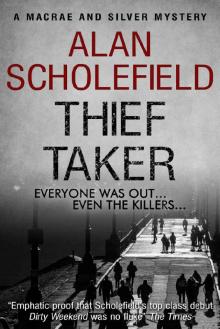 Thief Taker (A Macrae and Silver Mystery Book 3)
Thief Taker (A Macrae and Silver Mystery Book 3)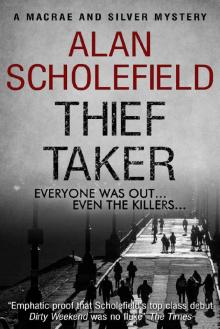 Thief Taker
Thief Taker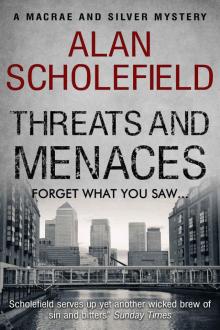 Threats and Menaces
Threats and Menaces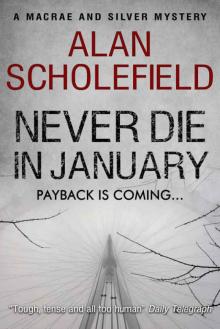 Never Die in January
Never Die in January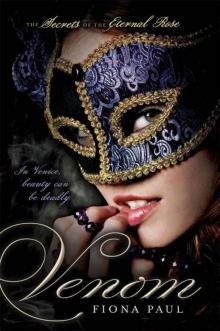 Venom
Venom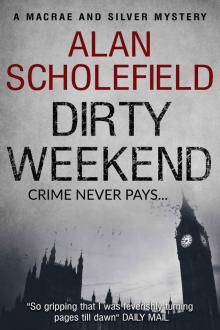 Dirty Weekend (Macrae and Silver Book 1)
Dirty Weekend (Macrae and Silver Book 1)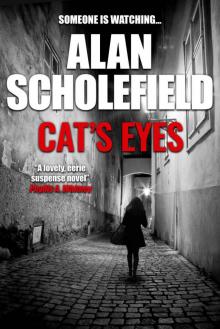 Cat's Eyes
Cat's Eyes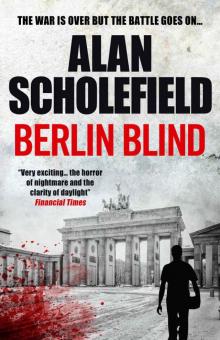 Berlin Blind
Berlin Blind The Sea Cave
The Sea Cave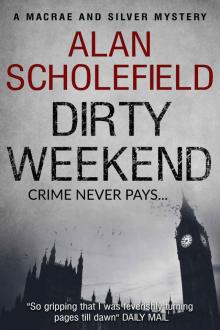 Dirty Weekend
Dirty Weekend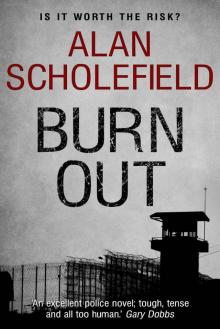 Burn Out (Dr. Anne Vernon Book 1)
Burn Out (Dr. Anne Vernon Book 1)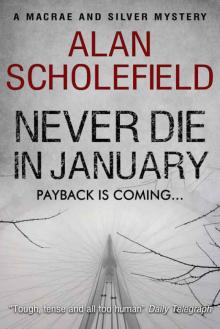 Never Die in January (A Macrae and Silver Mystery Book 2)
Never Die in January (A Macrae and Silver Mystery Book 2)